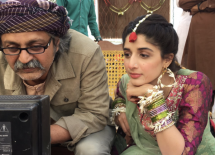TV Drama “Sammi”
Hailed by critics and viewers alike, the Pakistani television drama Sammi was called a “stand out” by the English-Language publication The News on Sunday, while the website Hip In Pakistan called it the show “no one should miss.”
Sammi uses engrossing characters and engaging storytelling to raise awareness of social issues and prejudices rarely discussed in mainstream Pakistani society – with the ultimate goal of encouraging behavior change.
Over the course of 21 episodes, Sammi was seen by as many as 3.5 million viewers per airing and an average of 800,000 people have watched each episode on YouTube. The drama depicts the harmful effects of a society that values men and sons over women and daughters. The show confronts issues such as the financial strain and health risks caused by a lack of family planning. It also focuses on the harmful effects on families that prefer sons to daughters, compelling viewers to consider and discuss these deeply rooted but outdated and harmful traditions and customs.
The very first episode confronts vani, an archaic and illegal custom still prevalent in some areas of Pakistan in which a young girl is forcibly married as part of the punishment for a crime committed by her male relatives. Sammi, a young girl living in a traditional village, is horrified when she is given by her family to a man old enough to be her father. While technically illegal in Pakistan, vani is still used in some places and is a stark representation of the value society places on the lives of men over women.
Sammi aired its last episode on June 25, 2017, although it is now being translated from Urdu into three other languages in order to be shown on regional channels. The 21-episode drama was produced by the Johns Hopkins Center for Communication Programs, in partnership with the Center for Communication Programs Pakistan, MD Productions and Hum TV, a 24-hour network in Pakistan. It was supported by the USAID-funded Health Communication Component and the DFID-funded Empowerment, Voice and Accountability for Better Health and Nutrition project.
Source: Johns Hopkins University Center for Communication Programs
Date of Publication: March 25, 2019
SIMILIAR RESOURCES
Tools
Examples
- Entertainment-Education Curriculum
- Noora Health COVID-19 Resources
- FGM Infographics
- Training Toolkit on MSM Programming for the MENA Region
- WHO Guidelines on Ensuring Human Rights in the Provision of Contraceptive Information and Services: Guidance and Recommendations
- Quality of Care in Contraceptive Information and Services, Based on Human Rights Standards: A Checklist for Health Care Providers
- Framework for Ensuring Human Rights in the Provision of Contraceptive Information and Services
- Tackling the Taboo: Sexuality and Gender-Transformative Programmes to End Chlld, Early, and Forced Marriage and Unions
- Rights in the Time of COVID-19 Infographic
- Rights in the Time of COVID-19: Lessons from HIV for an effective, community-led response

